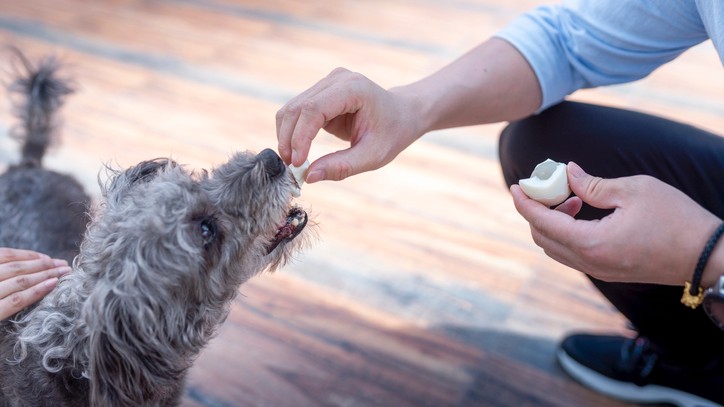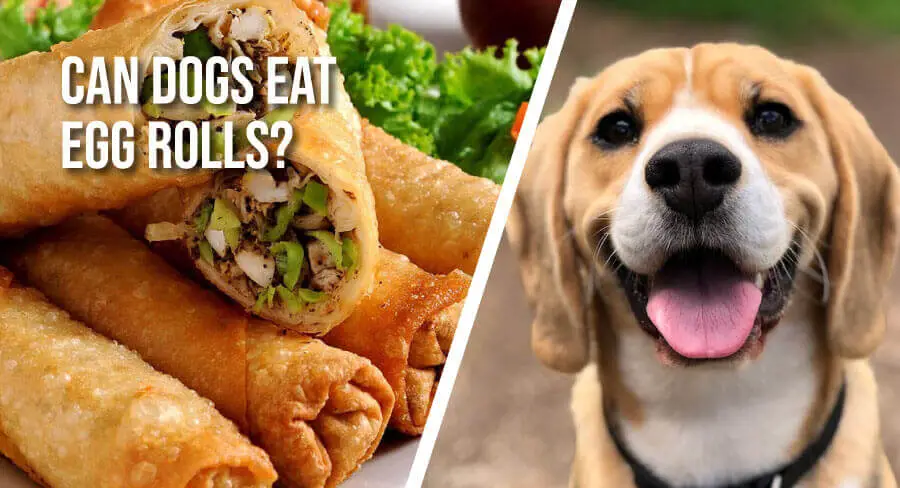Egg rolls can make a tasty treat for humans, but can our canine companions enjoy them too? While dogs can eat some human foods, there are important factors to consider before feeding egg rolls to dogs. In this article, we’ll explore whether dogs can eat egg rolls, the potential benefits and risks, and tips for safely serving egg rolls to pets.
First, let’s examine what egg rolls are made of. Egg rolls have an outer wrapper made of wheat or rice flour. The filling typically contains meat, vegetables, and other ingredients bound in a batter. Common fillings are pork, shrimp, chicken, cabbage, carrots, onions, and garlic. The ingredients are seasoned with soy sauce, sesame oil, salt, and other spices.

Can Dogs Have Egg Rolls?
- In moderation, plain egg rolls can be safe for dogs as an occasional treat. The primary risk is gastrointestinal upset from spices, salt, or oil. Dogs have a harder time digesting salty, spicy, or fried foods than humans do.
- Egg rolls without seasoning or heavy frying are least likely to cause stomach upset. Homemade egg rolls with lean meat, vegetables, and whole grains can make a balanced snack.
- Dogs should only eat fully cooked egg rolls, never raw. Raw egg or meat risks salmonella or E. coli poisoning in dogs. Thorough cooking kills any harmful bacteria.
- Avoid egg rolls with onion or garlic, as these ingredients can cause anemia in dogs if eaten in large amounts. Small quantities are usually not dangerous.
- Excess oil and frying can lead to stomach upset and pancreatitis in dogs. Pieces should be lightly fried and patted dry before serving.
- Egg rolls often contain salty sauces like duck sauce, soy sauce, hot mustard, or sweet and sour sauce. Skip the sauce or brush off any excess to limit sodium.
- Smaller dogs should be limited to only 1-2 bite-sized pieces of egg roll at most. Larger dogs may be able to handle a whole egg roll. But high fat foods should be fed sparingly.
- Feeding egg rolls too often can lead to gastrointestinal problems, obesity, and unbalanced nutrition in dogs. Treat as an occasional snack, not a regular meal component.
So in moderation, plain, homemade, well-cooked egg rolls can be safe for dogs. But there are some risks to be aware of. Follow proper precautions for preparation and portion size.
Benefits of Egg Rolls for Dogs
Feeding egg rolls to dogs can provide some benefits, if done carefully. Potential benefits include:
- Lean protein – Egg rolls made with chicken, pork, shrimp, or tofu contain lean protein sources dogs need.
- Fiber & nutrients – Filling ingredients like cabbage, carrots, and celery provide dietary fiber, vitamins, and minerals.
- Healthy fats – Egg roll wrappers contain heart-healthy polyunsaturated and monounsaturated fats when pan-fried.
- Mental stimulation – The textures and flavors can provide dogs with mental enrichment.
- Bonding – Sharing a people-food snack can enhance the human-canine bond (in moderation).
When made thoughtfully, egg rolls can be a vessel for healthy, natural ingredients dogs need. Homemade or high-quality egg rolls are ideal for maximizing nutritional value.
Risks of Feeding Dogs Egg Rolls
While egg rolls can have some benefits, there are also potential risks to be cautious of:
- Fat & calories – Egg rolls are high in fat and calories, which can quickly lead to weight gain or pancreatitis in dogs if overfed.
- GI problems – Greasy, spicy foods often cause stomach upset, vomiting or diarrhea. Onions and garlic also pose a risk.
- Salt – High sodium can be harmful to dogs, causing excessive thirst and urination or sodium ion poisoning.
- Choking hazard – Chewy egg roll skins or chunks of filling may pose a choking risk, especially for small dogs. Pieces should be chopped up.
- Raw ingredients – Raw meat and eggs can contain salmonella and E. coli bacteria that make dogs sick.
- Nutritional imbalance – People food should not make up the bulk of a dog’s diet. An excess can create vitamin deficiencies.
While the occasional plain egg roll may be alright, these risks mean dogs shouldn’t eat them regularly or in excess.
Tips for Safely Feeding Dogs Egg Rolls
If you want to share a bites of egg roll with your dog, follow these tips to reduce risks:
- Choose egg rolls cooked without spicy seasonings or salty sauces.
- Brush off any excess oil before feeding to reduce greasiness.
- Chop pieces into small, bite-sized portions appropriate for your dog’s size.
- Avoid raw or undercooked egg rolls, which could make a dog sick.
- For homemade egg rolls, use lean proteins, whole grains, and veggies. Skip onions and garlic.
- Feed egg rolls infrequently and in moderation – no more than 10% of their diet.
- Introduce new foods slowly and monitor for allergic reactions or tummy trouble.
- Make sure your dog is active enough to burn extra treats calories and doesn’t become overweight.
- Talk to your vet if concerned about diet and nutrition for your individual dog.
With common sense precautions, egg rolls can occasionally be shared as a safe human food treat for dogs. But they shouldn’t become a regular part of a dog’s meal plan.
Can Dogs Eat Egg Rolls FAQ
Can puppies eat egg rolls?
No, egg rolls should not be fed to puppies under 1 year old. Their digestive systems are even more sensitive. Wait until puppies are fully grown before trying small bits of egg roll.
Should old dogs eat egg rolls?
Senior dogs with dental issues or digestive troubles should avoid egg rolls, as they can be difficult to chew and digest. Stick to your vet’s recommendations for gentle senior dog foods.
What about egg roll wrappers or skins?
Plain egg roll wrappers are lower in fat than whole egg rolls. But they still contain refined carbs and oils, so should only be an occasional treat.
Can diabetic dogs have egg rolls?
No, egg rolls are high in refined carbs and fat, which can destabilize blood sugar in diabetic dogs. Stick to low glycemic foods for diabetic pets.
Are egg rolls bad for dogs with pancreatitis?
Yes, the high fat content of egg rolls can severely worsen pancreatitis inflammation. Dogs prone to pancreatitis should not eat egg rolls or other fatty people foods.
Conclusion
Egg rolls can occasionally be fed to dogs in moderation, but there are some important health risks and precautions to consider. Plain, well-cooked egg rolls are safest when shared sparingly as a treat. They should not become a regular part of a balanced canine diet. Following portion control, monitoring for reactions, and discussing any diet changes with your vet can help make sure egg rolls don’t negatively impact your dog’s health. With care, egg roll nibbles can be a way for dogs to share the experience of a beloved human food. It is important to remember that moderation is key when it comes to giving pets food treats.
